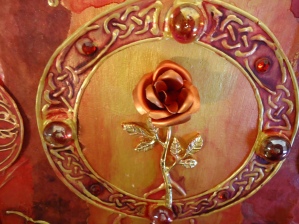 Music in ritual–and in specific, singing–is probably the most potent magic I know. I’m sitting here trying to get all the final prep done for Pantheacon, as I leave in just a few hours. Part of my prep for any event is warming my voice up because I know how crucial it is to be able to have a strong voice to anchor the chanting. And when I travel and teach, I’m singing for days as I lead workshops and rituals, so I need that prep.
Music in ritual–and in specific, singing–is probably the most potent magic I know. I’m sitting here trying to get all the final prep done for Pantheacon, as I leave in just a few hours. Part of my prep for any event is warming my voice up because I know how crucial it is to be able to have a strong voice to anchor the chanting. And when I travel and teach, I’m singing for days as I lead workshops and rituals, so I need that prep.
I had to rediscover music as an adult, and now it’s one of my great joys. In grade school I had a hard time in music class singing the right notes. I didn’t understand until a lot later that it was partly because of my allergies, but also, my voice was too deep to sing the “girl” parts. I couldn’t sing the high notes so I’d sing off key, and I was admonished to just sing quietly, or just given that “look” that told me I didn’t sound good but they weren’t going to say anything.
I never wanted to take band classes later because I was so afraid of sucking at it because of that experience, though I did have a keyboard at home and I’d figure out the notes for songs I liked. Years later I tried to teach myself how to mix techno, and that went well till I set a stereo on fire…I guess I needed more sound engineering theory.
It wasn’t until my late 20’s when I got involved with the Reclaiming tradition that I started singing again. I was told it was ok to sing the wrong notes. After a while, I learned that I could, indeed, sing the correct notes. After a few years, I also learned that most women tend to start chants at a higher pitch than I can follow, so I learned to sing low harmony.
Now, years later, here I am leading chants in rituals getting groups to sing, and teaching workshops on chanting, and I love it.
I’m teaching workshops on chanting at both Pantheacon and Convocation. And many other traditions also have been weaving in more of the power of music over the years. A Pantheacon attendee a year or so ago mentioned to me that they were fascinated to see some complicated musical techniques being used (or taught) that year, and that seemed to be something new but they commented on how effective it was.
This year, I was hoping to have a CD of chants and some trance journeys recorded. It’s not professional level recording work, but it’s at least decent recordings to get things out there as a resource. One thing people always ask me is, “Where can I find the chants you sing?” and, many of them you can’t.
I don’t quite have that done, but I’m committing to finishing it up when I return home from Pantheacon and Convocation.
People ask me all the time about ritual technique and specifically how to make ritual more potent. One answer is simple, it’s just not easy–learn to sing. Learn to drum, learn a simple instrument. Get a singing bowl or a shruti box and learn to use them well. But singing you can take anywhere, singing you don’t need an external tool for.
It’s not going to be quick. Learning to sing took me years, but it’s a big factor in what makes rituals go deeper, more intense. It’s worth putting in the time. Whenever a Pagan talks about ancient mysteries from our lost ancestors and all the druid lore that was never written down, trust me when I say this: our ancestors were singing. Our ancestors were using song and chant and drumming to effect a trance state. The Celtic poets were using the power of word and song to craft magic.
And you, too, can bring this magic.
 Music in ritual–and in specific, singing–is probably the most potent magic I know. I’m sitting here trying to get all the final prep done for Pantheacon, as I leave in just a few hours. Part of my prep for any event is warming my voice up because I know how crucial it is to be able to have a strong voice to anchor the chanting. And when I travel and teach, I’m singing for days as I lead workshops and rituals, so I need that prep.
Music in ritual–and in specific, singing–is probably the most potent magic I know. I’m sitting here trying to get all the final prep done for Pantheacon, as I leave in just a few hours. Part of my prep for any event is warming my voice up because I know how crucial it is to be able to have a strong voice to anchor the chanting. And when I travel and teach, I’m singing for days as I lead workshops and rituals, so I need that prep.